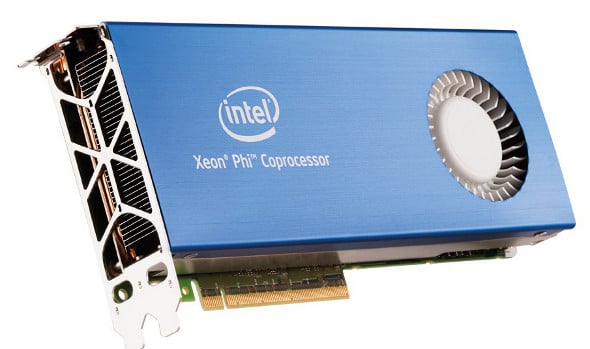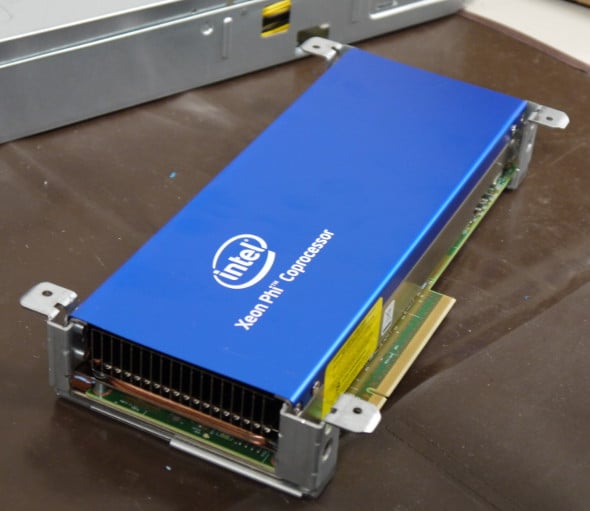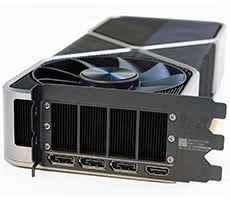Intel’s Exascale HPC Revolution and Xeon Phi
The Intel Xeon Phi Coprocessor 3100 Family and 5110p
For Intel, years of heady talk about parallelism and exascale computing have finally come to fruition. Intel is bringing to market a pair of Xeon Phi coprocessor offerings in 2013, the 3100 family and the 5110p.
There are currently two Intel Xeon Phi Coprocessor in the 3100 family, with the primary difference being that one is actively cooled with a built-in fan and the other is passively cooled. Both are PCI Express add-in boards and offer >1 teraflop peak double precision performance and offer 28.5MB cache and 6GB GDDR5 memory capable of 5GT/s and 240GB/s bandwidth. Both are built on Intel's 22nm process and feature 300W board TDPs. The maximum number of cores and clock speeds of the 3100 series Xeon Phi coprocessors are unknown at this time.
Intel believes that the 3100 coprocessors are ideal parallel computing solution, that target compute bound workloads in areas such as life sciences, linear algebra, banking, and more.

Intel Xeon Phi
Like the 3100 coprocessors, the passively-cooled 5110p is a PCIe add-in card, It offers 1,011 gigaflops per second performance with 60 max cores clocked at 1.053GHz. The coprocessor has 30MB of cache and is pared to 8GB of GDDR5 memory running at 5GT/s and offers 320GB/s bandwidth. Board power is 225W.
Intel claims the 5110p as optimized for memory bandwidth and memory capacity bound workloads, ideal for applications such as STREAM and digital content creation.
Because Intel wanted users to be able to use common tools and programming languages with the Xeon Phi coprocessors, both the 3100 family and 5110p support C, C++, Fortran, and other familiar Intel and third-party tools.
The 5110p is available to order now, and will be shipping by January 28th, while the 3100 family is coming sometime in the first half of 2013. The exact pricing for the 3100 coprocessors is still undisclosed, but they will reportedly be under $2,000; the 5100p, on the other hand, will run $2,649.

Intel Xeon Phi in the wild, destined for the Stampede supercomputer at the TACC
Of note is that those prices match up well with some of the competition, landing at price points one could expect to pay for some last-generation NVIDIA Tesla cards. Speaking of NVIDIA, the company also announced its latest HPC offerings today with the K20 and K20X GPUs, which sport some similar specifications to the Intel Xeon Phi coprocessors. Obviously, Intel is approaching supercomputing from the CPU side while NVIDIA is tackling things with its GPUs, but both are focusing on many-core architectures designed for highly parallel computing workloads.
There are currently two Intel Xeon Phi Coprocessor in the 3100 family, with the primary difference being that one is actively cooled with a built-in fan and the other is passively cooled. Both are PCI Express add-in boards and offer >1 teraflop peak double precision performance and offer 28.5MB cache and 6GB GDDR5 memory capable of 5GT/s and 240GB/s bandwidth. Both are built on Intel's 22nm process and feature 300W board TDPs. The maximum number of cores and clock speeds of the 3100 series Xeon Phi coprocessors are unknown at this time.
Intel believes that the 3100 coprocessors are ideal parallel computing solution, that target compute bound workloads in areas such as life sciences, linear algebra, banking, and more.

Intel Xeon Phi
Like the 3100 coprocessors, the passively-cooled 5110p is a PCIe add-in card, It offers 1,011 gigaflops per second performance with 60 max cores clocked at 1.053GHz. The coprocessor has 30MB of cache and is pared to 8GB of GDDR5 memory running at 5GT/s and offers 320GB/s bandwidth. Board power is 225W.
Intel claims the 5110p as optimized for memory bandwidth and memory capacity bound workloads, ideal for applications such as STREAM and digital content creation.
Because Intel wanted users to be able to use common tools and programming languages with the Xeon Phi coprocessors, both the 3100 family and 5110p support C, C++, Fortran, and other familiar Intel and third-party tools.
The 5110p is available to order now, and will be shipping by January 28th, while the 3100 family is coming sometime in the first half of 2013. The exact pricing for the 3100 coprocessors is still undisclosed, but they will reportedly be under $2,000; the 5100p, on the other hand, will run $2,649.

Intel Xeon Phi in the wild, destined for the Stampede supercomputer at the TACC
Of note is that those prices match up well with some of the competition, landing at price points one could expect to pay for some last-generation NVIDIA Tesla cards. Speaking of NVIDIA, the company also announced its latest HPC offerings today with the K20 and K20X GPUs, which sport some similar specifications to the Intel Xeon Phi coprocessors. Obviously, Intel is approaching supercomputing from the CPU side while NVIDIA is tackling things with its GPUs, but both are focusing on many-core architectures designed for highly parallel computing workloads.






